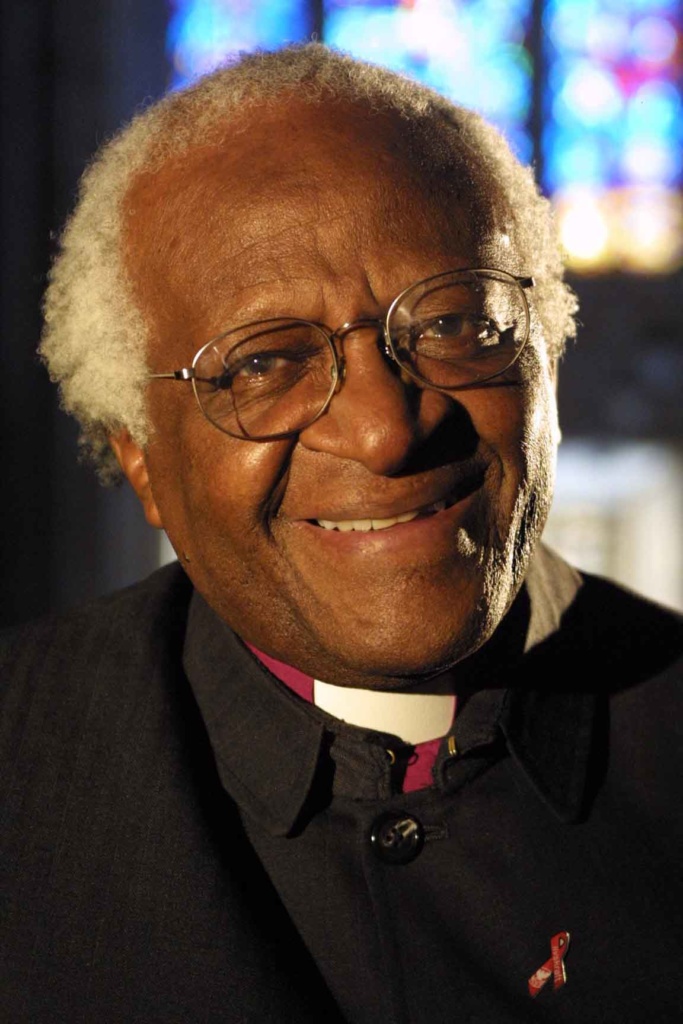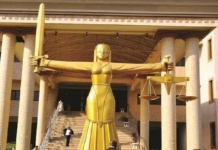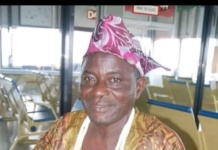
Professor Chris O Imafidon, a co-recipient of African Achievers Awards with Archbishop Desmond Mpilo Tutu, shares some unknown truths and personal thoughts on one of the greatest giants of all generations. Both The Most Reverend (Dr) Desmond Tutu and Professor Chris Imafidon were hosted by HM Queen Elizabeth II at Commonwealth celebrations at Westminster Abbey, and they share a passion for empowerment, education and equity.
Archbishop Tutu was more than an icon of spirituality, equality or humanity, he was the consummate embodiment of action-backed faith, charity, boldness and forgiveness. Archbishop Emeritus Desmond Tutu was the true representative of the Prince of PEACE #PrinceOfPeace.
PASSION
The younger generations need to be showed how Archbishop Tutu utilized his pulpit, parish and the podium to transform power without being a politician. He was a true genius who with unique preparations pushed the pew, position, persecution and protests to redefine peace and accelerated change on a global scale. He was a leader to leaders; a pastor to pastors; in priesthood, he was a priest to priests and the most extraordinary change agent to the African public and global institutions. His voice echoed with passion at formal or informal meetings. He represented his people and oppressed peoples globally without being appointed an ambassador. He was a vicar to the vulnerable and voiceless irrespective of their religion or faith.
PRINCIPLES
The young Desmond Tutu was keen on education and trained as a teacher in the mistaken belief that education was a tool of empowerment. In reality the government education policies were designed to support a racist and very discriminatory government. So he quickly left the classroom. From the moment he resigned from his post as a schoolteacher rather than comply with the orders of the racist, repressive apartheid regime in South Africa in 1958. He understood that ALL of us were created in the image of God, and each of us is a God carrier, a genius. As if to echo www.ExcellenceinEducation.org.uk mantra that #EveryChildIsAGenius. And our intrinsic worth was not a factor of colour, sex, class etc.
Desmond Tutu never deviated from his principles, fighting for tolerance, equality and justice at home and abroad. This brought him love, influence and a moral prestige equalled by few others on the African continent or beyond.
PEACE
Archbishop believed in peaceful co-existence of different communities, but he was very vocal against injustice. So, ill-informed western political actors mislabelled him as a “terrorist” or a “thug,” he persevered, and in 1984, he picked up the Nobel Prize for PEACE! He once said….”If you want peace, you also talk to your enemies.” He taught us how to conduct strategic fights until victory was certain. His words and corresponding actions are a masterclass in diplomacy and giant slaying. He believed that if God is for us, who can be against you. He demonstrated presidential powers without being a president. He left the discriminatory teaching position of apartheid South Africa and ended up teaching the world and influence, impact and inspiration. He was a father to fathers. He worked tirelessly for healing without being a doctor. His voice was his most potent weapon.
PRESIDENTIAL POWER/PARLIAMENT
In 2017, I was invited to the British Parliament in London to receive an award which Archbishop Tutu was a previous recipient. In 2004 was at the Abbey for the Commonwealth Annual Service. If you met him, you will immediately recognize a very humble human. It will never occur to you that he is an international power broker, who has more presidents’ telephone numbers stored in his contact list than most presidents. Yet no multi-layered security teams, or protocol around. He was king of conflict resolution and peaceful co-existence.
PALACE
Her Majesty, Queen Elizabeth II was right when she wrote “……Archbishop Desmond Tutu, tirelessly championed human rights in South Africa and across the world. Adding that “I remember with fondness my meetings with him and his great warmth and humour.” Buckingham palace confirms that “Archbishop Tutu’s loss will be felt by the people of South Africa, and by so many people in Great Britain, Northern Ireland and across the Commonwealth.”. But earlier in 1984, as a young graduate his words inspired me to write a paper entitled – Racism is a sin unto death.
PUBLIC PERSONA
Reverend Dr Tutu’s personal and public views were the same. What you saw was exactly what you got. His advocacy which often mistaken for activism was unending.. His family states that “..the wider world showered him with honours, most notably the Nobel Peace Prize in 1984, and after retirement his primary international responsibility was with a group of fellow Nobel Peace Laureates and statespersons known as ‘The Elders,’ committed to international problem-solving and peace-making.
The statement added that “Officially “retiring” from public life on his 79th birthday, Archbishop Tutu continued to speak out on a range of ethical and moral issues: illegal arms deals, xenophobia, oppressed peoples of the Middle East, respect for the rule of law, HIV/Aids, Tibet, China, Rohingya Muslims in Myanmar etc. He also vociferously campaigned for gentler stewardship of the Earth, and against the coming ravages of climate change, a very real example of how human survival rests on our ubuntu-spirited ability to cooperate and work together. Tutu spent the closing years of his life increasingly devoted to prayer and contemplation, in the Milnerton home he and his wife shared.
PARTNER
Archbishop Tutu leaves behind his wife Mam Leah Tutu, who has been described as his “soul mate and source of strength” as well as four children and several grandchildren. The statement from his family, described him as a man who “turned his own misfortune into a teaching opportunity to raise awareness and reduce the suffering of others.”
As Mrs Tutu says, “although he was not physically imposing, he had the inner strength of a lion. It can be recalled that Tutu was diagnosed with prostate cancer in the late 1990s and in recent years he was hospitalised on several occasions to treat infections associated with his treatment.”
It added: “He wanted the world to know that he had prostate cancer, and that the sooner it is detected the better the chance of managing it.
“Ultimately, at the age of 90, he died peacefully at the Oasis Frail Care Centre in Cape Town this morning.”
PRIESTS’ PRAISE
Hon Most Revd Justin Welby, the current Archbishop of Canterbury captures the mood of Christians when he said, “Desmond Tutu – always known as Arch – was a prophet and priest, a man of words and action, one who embodied the hope and joy that were the foundations of his life.” Continuing, he said that “He was a man of extraordinary personal courage and bravery: when the police burst into Cape Town Cathedral, he defied them by dancing down the aisle.”
Tutu’s love “transformed the lives of politicians and priests, township dwellers and world leaders”, he added, saying he was a pioneer and “a man of enormous vision”.
He also spoke of his “extraordinary, bubbly, overwhelming sense of humour”, adding “you laughed the whole time when you met him”.
Another senior clergy of African extraction, Former Archbishop of York Dr John Sentamu said Archbishop Tutu was a man of “amazing faith” who was “so rooted in Christ he feared nothing”.
PATHWAY
Born in 1931 in Klerksdorp, Desmond, a schoolteacher’s son, Tutu was born in Klerksdorp, Transvaal, a conservative town west of Johannesburg, South Africa, on October 7, 1931. He initially worked as a teacher, but quit in 1957 to join the church, studying first at St. Peter’s Theological College in Johannesburg.
He was ordained a priest in 1961 and continued his education at King’s College in London, before becoming Anglican Dean of Johannesburg in 1975.
Rev Dr. Tutu was named the first Black Archbishop of Cape Town in 1986, becoming the head of the Anglican Church, South Africa’s fourth largest. He would retain that position until 1996. During the 1980s, he played a role in drawing national and international attention to the iniquities of apartheid.
He later chaired the Truth and Reconciliation Commission and has continued to draw attention to a number of social justice issues over the years.
PEOPLE Vs PLACES
Anywhere Arch Tutu went people saw the authenticity. Ask the multi-award winning European legend, Sir Bob Geldof about Arch Tutu, he says “I am lucky that in my life I knew Desmond Tutu, one of the greatest men of our time. This tiny giant, this impish little priest, had the dangerously insane courage of the gods. And it was through his God that he found the voice to unremittingly challenge oppressors and speak endlessly, eloquently for the beaten down, the trodden on, the innocent and poor of this world. And later, when the righteous justice of his rhetoric had come to pass, he – along with his great friend Nelson Mandela – proposed the national dignity that only forgiveness of the past and the vanquished can bestow.
Concluding, Sir Geldof states “An archbishop knows the root spring of their moral thought and spiritual teaching, and Tutu was above everything a priest – albeit the funniest one I’ve ever known. He was inexhaustible and exhausting in conversation, challenging every one of your cherished premises with either an irritable dismissiveness or a derisive giggle – which was extremely annoying!”
Adding that Tutu was brave beyond measure. His constant challenge to the ideology and agents of thuggish power put him in grave danger. Showing no fear, he railed against their iniquities and rallied his people, never allowing them to falter or doubt the legitimacy of their struggle. And yet his prayers, his speeches, while suffused with rage, preached peace. His rejection of violence as the instrument of the weak and frightened, of those who had nothing left but the club, whip and gun, was once again proved correct. He would not, he could not, be stopped or silenced. This along with the equally towering display of moral authority from Mandela, his partner in change, allowed for the extraordinary and final peaceful exchange of power in South Africa.
Kindly follow us on twitter:@AfricanVoice2









